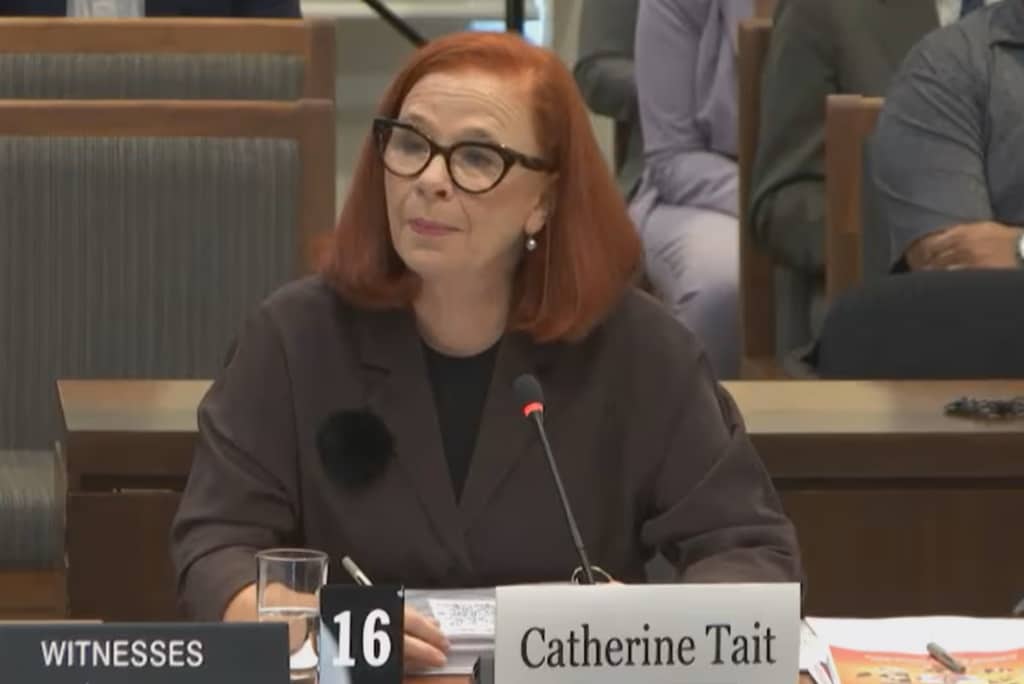Business
Boeing’s Next Big Problem Could Be A Strike By 32,000 Workers

Boeing has faced a slew of negative news over the last six years, with nearly nothing but issues. Later this month, it may add a strike by 32,000 workers to its list of difficulties.
The contract between Boeing and the International Association of Machinists expires at 11:59 p.m. PT on September 12. Without a new contract, the workers who construct Boeing’s jets in Washington state are poised to launch the company’s first strike in 16 years. According to the chairman of the local union, the odds of reaching an agreement are slim right now.
“We’re far apart on all the main issues – wages, health care, retirement, time off,” Jon Holden, president of IAM District 751, told CNN last week. “We continue to work through that, but it’s been a tough slog to get through.”
Boeing’s Next Big Problem Could Be A Strike By 32,000 Workers
It’s just the latest in a string of serious and high-profile issues at a company that has dealt with fatal crashes blamed on a design flaw in its best-selling jet, accusations that it prioritized profits and production speed over quality and safety, plummeting aircraft sales, an agreement to plead guilty to criminal charges of deceiving regulators, and massive financial losses covered by soaring debt levels.
Both sides claim they want to reach an agreement without a strike. However, rank-and-file union members’ outrage at recent contract concessions and challenges at the once-proud company may make achieving that agreement in the short term challenging.
“We continue to bargain in good faith as we focus on the topics that are important to our employees and their families,” according to Boeing’s statement. “We’re confident we can reach a deal that balances the needs of our employees and the business realities we face as a company.”
However, Holden stated that any contract that would gain the approval of the rank-and-file must recoup some of the concessions the union gave up in two previous accords since 2008.
Both of these discussions were about contract extensions, not new deals. In both situations, the union felt compelled to agree to concessions, such as increased member payments for health insurance and the elimination of traditional pension schemes, or risk losing thousands of jobs. Boeing threatened to create nonunion plants to produce the 737 Max and 777X. Boeing, which already has a nonunion 787 Dreamliner plant in South Carolina, canceled plans for new nonunion facilities as part of those agreements.
Boeing enters these discussions with a new CEO, Kelly Ortberg, who took the job on August 8. He said that he intends to “reset our relationship” with the union after meeting with Holden and other union leaders during his first week on the job. However, Holden stated that he has noticed no differences in Boeing’s negotiating position.
In July, Ortberg’s predecessor, former CEO Dave Calhoun, likewise told investors that Boeing’s objective is to avoid a strike, implying that the company is willing to pay whatever it takes to avoid a work stoppage.
“We know the wage demands will be high,” he said. “We are not scared to treat our staff well during this process. So, we’ll just work as hard as we can to avoid a strike.”
According to the corporation, IAM members’ incomes have climbed by 60% in the last ten years due to regular wage increases, cost-of-living adjustments, and incentive compensation. However, the union remains dissatisfied with the previous compromises. It also seeks increased time off and better employment guarantees to avoid losing jobs to nonunion plants.
“We cannot go through another period where a year or two from now where our jobs are threatened,” Holden pointed out.
Several unions, including the Teamsters at UPS and the United Auto Workers at GM, Ford, and Stellantis, received double-digit salary increases in recent union agreements. However, in those cases, they were bargaining with firms making record profits and had ample resources to meet union requests.
By comparison, Boeing’s issues have resulted in $33.3 billion in core operating losses over the last five years, driving the corporation into deep debt. It is in danger of having its debt downgraded to junk bond status, but Holden argues that the union still has bargaining power in these negotiations.
Despite its issues, Boeing remains a huge power in the US economy, and shutting it down will have far-reaching consequences. Beyond the 32,000 union members among the almost 150,000 US employees, the corporation calculates its economic impact at $79 billion, supporting 1.6 million direct and indirect jobs at more than 9,900 suppliers in all 50 states.
Boeing’s Next Big Problem Could Be A Strike By 32,000 Workers
However, more critically, Boeing is one of just two main providers of commercial aeroplanes to the airline sector. The industry is already coping with Boeing’s delayed deliveries, which cannot be resumed until the company addresses concerns about the safety and quality of its aircraft.
“They haven’t said they can’t afford our proposals,” he told me. “They’re reasonable. We’re in a difficult situation due to their actions to continue boosting dividends and share repurchases while reducing R&D. They have been unable to launch a new airplane. We are in this position as a result of such judgments and crashes.
One of the union’s negotiation objectives is to have a union representative on the Boeing board of directors, which has been heavily criticized for the company’s numerous issues.
“The board certainly deserves to be criticized,” Holden added. “We do not want to run the company. However, we want to ensure that our perspectives are heard regarding the decisions. We adore the Boeing Company. The board members don’t. They compromised its integrity.
SOURCE | AP
Business
Subsidies for Electric Vehicles Cut as Consumer Interest Fades

Pressure is building on Canada’s electric vehicle manufacturers, and several are rethinking their stance on E.V.s in favor of plug-in hybrids. Automobile manufacturers are now bracing themselves for an even more challenging era in the Canadian market for electric vehicles (E.V.s).
President Kristian Aquilina of General Motors Canada claims that support and expectations are misaligned because the Canadian government is reducing subsidies for electric vehicles while trying to phase out gas-powered cars.
Manufacturers find pushing for an all-electric future in Canada increasingly difficult due to fewer consumer financial incentives and increasingly strict sales targets.
With subsidies totaling up to C$12,000 (about $8,500), Canadian consumers may save a tonne of money on electric automobiles. The federal government offers a rebate of up to $5,000 Canadian, and the provinces of Quebec and British Columbia provide further incentives of up to $7,000 and $4,000, respectively.

Ford lost about $132,000 US for every E.V. it sold in the first three months of the year.
Ontario, which eliminated rebates in 2018, had the lowest market share for electric vehicles compared to Quebec and British Columbia, two regions that offered bigger incentives and thereby drove E.V. adoption in Canada.
Although this backing is dwindling, the province of Quebec has now declared that all subsidies will end in 2027. In June, the British Columbia government restricted incentives to a smaller subset of E.V. purchasers for “available funding” and higher-than-expected E.V. sales growth.
These reductions indicate a larger pattern: provincial governments reevaluate the sustainability of taxpayer-financed incentives for E.V.s as budget deficits widen.
With lofty goals to cut pollution from gas-powered cars and increase sales of electric vehicles, the Canadian government has reduced subsidies for these vehicles. Electric or plug-in hybrid vehicles will be mandatory for all new light-duty vehicle sales in Canada by 2035.

Some opposition critics say that B.C. needs to step up with incentives for consumers to buy used E.V.s.
To meet our intermediate goals, 20% of new sales must be electric vehicles (E.V.s) by 2026 and 60% by 2030. Car companies are already under a lot of pressure due to dwindling incentives and increasing demands, and the clock is ticking faster by the second.
In addition, these rules impose new forms of responsibility. Automakers that do not reach their provincial sales targets may be subject to financial fines imposed by provinces such as British Columbia.
Canadian manufacturers are already under financial pressure from federal compliance credit system standards, which they must meet or face deficits. This system gives them credit for electric vehicle sales and infrastructure improvements, but it’s not without its challenges.
“The timing is not necessarily lining up very well, in that the purchase incentive support comes off just as mandates and regulations start to bite,” GMC Canada President Kristian Aquilina told Bloomberg. “It must make a difference.
Therefore, we must consider that. Despite the cutbacks, Aquilina argued that the government’s investment in enhancing the charging infrastructure could benefit E.V. sales.
Related News:
Tesla Sales Fall As More Electric Vehicles Crowd the Market
Tesla Sales Fall Again As More Automakers Crowd Electric Vehicle Market
Business
Chewy Slides After Filing Shows 3rd-Biggest Shareholder, ‘Roaring Kitty,’ Sold His Stake

Washington — Chewy shares fell about 2% overnight Wednesday after a regulatory filing showed that Roaring Kitty, a meme stock trader, sold his interest in the online pet retailer.
According to a beneficial ownership document filed with the Securities and Exchange Commission on Tuesday, Roaring Kitty, whose legal name is Keith Gill, sold all his Chewy shares, totaling 6.6% of the company.
Chewy Slides After Filing Shows Third-Biggest Shareholder, ‘Roaring Kitty,’ Sold His Stake
Plantation, Florida-based Chewy dropped 1.9% after hours to $26.19 per share.
Gill, an investor at the core of the meme stock craze, bought more than 9 million shares of Chewy in July, making him the company’s third-largest stakeholder.
Gill built a name for himself in 2021 by rallying ordinary investors around GameStop. At the time, the video game shop was fighting to stay in business, and major Wall Street hedge funds and investors were betting against it or shorting the stock. But Gill and those who agreed with him altered GameStop’s direction by purchasing thousands of shares despite practically all acknowledged criteria indicating that the firm was in deep peril.
 Chewy Slides After Filing Shows Third-Biggest Shareholder, ‘Roaring Kitty,’ Sold His Stake
Chewy Slides After Filing Shows Third-Biggest Shareholder, ‘Roaring Kitty,’ Sold His Stake
That triggered what is known as a “short squeeze,” in which large investors who had bet on GameStop were obliged to buy its swiftly increasing stock to offset significant losses.
Gill has expressed confidence in GameStop Chairman and CEO Ryan Cohen’s ability to revamp the company following his success at Chewy. Cohen cofounded Chewy in 2011 and stepped down as CEO in 2018.
SOURCE | AP
Business
Canada CBC News CEO Catherine Tait Recalled to Parliamentary Committee

Canada CBC News reports that MPs have voted to recall CBC CEO Catherine Tait to a Commons committee for questioning, only a week after her last appearance, over the awarding of $18 million in bonuses to Canada CBC news executives.
The Conservatives, the Bloc Québécois, and the NDP joined forces to re-invite Ms. Tait, her successor Marie-Philippe Bouchard, and Heritage Minister Pascale St-Onge to appear before the Commons Heritage Committee.
Ms. Tait, who will relinquish her position as CEO and president of CBC/Radio Canada in January, addressed the committee last week. The House of Commons has passed a motion recalling her before the conclusion of her term, and she is now subject to an additional two hours of interrogation, which includes inquiries regarding bonuses.
MPs also resolved to summon Quebec broadcasting executive Marie-Philippe Bouchard, appointed as the new chief of CBC/Radio-Canada last week, to appear before she begins her new job following a House of Commons chamber debate.
Catherine Tait Exit Package
Catherine Tait rejected the Conservatives’ requests to deny an exit package, including bonuses, when she departed the position in January during last week’s committee hearing.
She also defended the award of $18.4 million in incentives to 1,194 staff members for the 2023-2024 fiscal year, which concluded in March, following the broadcaster’s achievement of performance indicators.
Kevin Waugh, a Conservative committee member who introduced the motion, stated that his party aimed to ensure Ms. Tait was “accountable to taxpayers” before her departure in January.
He informed The Globe and Mail that “Canadians are dissatisfied with the bonuses” and that Catherine Tait‘s exit package, which will not be disclosed, is a cause for concern.
“I am apprehensive that she has not received her bonuses in over two years, and that the Minister of Heritage or Privy Council will lavish her with bonuses when she departs in January,” he stated.
The Liberals opposed a portion of the motion that claimed that “the Liberal threat to cut funding” had resulted in the elimination of hundreds of jobs at CBC/Radio-Canada.
Defunding CBC News Canada
The Heritage Minister informed The Globe that the claim was “hypocritical,” as the Conservatives intended to completely defund CBC.
“The Conservatives’ actions today are a clear example of hypocrisy.” Ms. St-Onge stated that performance bonuses increased by 65% during the Harper Conservatives’ tenure, while CBC News Atlantic Canada experienced substantial budget cutbacks.
“As a government, we do not require any lessons from a party that has pledged to reduce the funding of CBC/Radio-Canada and the 8,000 jobs associated with it during its campaign.”
During the Tuesday debate, NDP MP Niki Ashton stated that her party endorses the “banning of executive bonuses” at CBC News Atlantic Canada but is opposed to “the Conservatives’ full frontal attack” on the broadcaster.
She stated, “We require a robust public broadcaster, but not one that distributes executive bonuses and eliminates positions.”
If the Conservatives establish the next government, they intend to deprive the CBC of public funding while maintaining French services.
Catherine Tait defended CBC and rebuffed MPs’ assaults during last week’s committee hearing. “It is evident that the members of this committee are making a concerted effort to discredit the organization and vilify me,” she stated.
Related News:
Canada’s Income Inequality Rises to its Highest Level Ever Under Trudeau
Canada’s Income Inequality Rises to its Highest Level Ever Under Trudeau
-
Tech4 weeks ago
Documents Show OpenAI’s From Nonprofit to $157B Valued Company Long Trip
-
Business4 weeks ago
Experts Are Perplexed By Tesla’s Sporty, Two-Seater Robotaxi Design.
-
Tech2 weeks ago
Apple Unveiled A Fresh Glimpse Of Their AI Featuring ChatGPT Integration.
-
Tech3 weeks ago
Connection Problems With The App Store Are Stopping Customers From Downloading Apps.
-
Business4 weeks ago
Uber And Lyft Stock Prices Surge After Telsa’s “Toothless” Robotaxi Revelation.
-
Tech4 weeks ago
Documents Show OpenAI’s Long Journey From Nonprofit To $157B Valued Company





 Chewy Slides After Filing Shows Third-Biggest Shareholder, ‘Roaring Kitty,’ Sold His Stake
Chewy Slides After Filing Shows Third-Biggest Shareholder, ‘Roaring Kitty,’ Sold His Stake



































